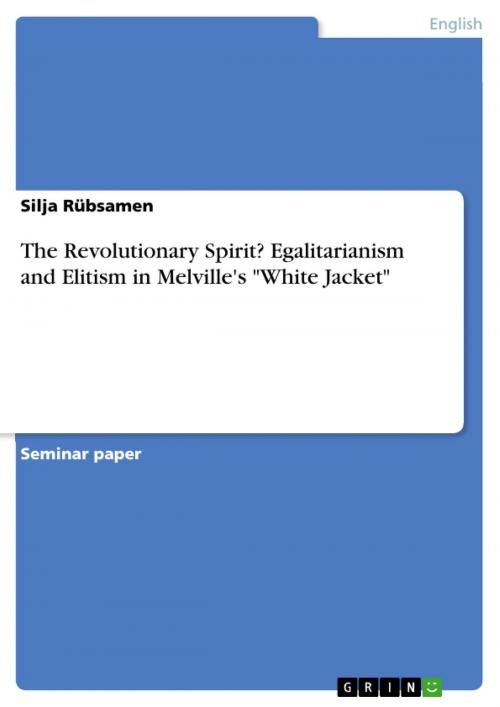The Revolutionary Spirit? Egalitarianism and Elitism in Melville's 'White Jacket'
Nonfiction, Entertainment, Drama, Anthologies| Author: | Silja Rübsamen | ISBN: | 9783638507462 |
| Publisher: | GRIN Publishing | Publication: | June 2, 2006 |
| Imprint: | GRIN Publishing | Language: | English |
| Author: | Silja Rübsamen |
| ISBN: | 9783638507462 |
| Publisher: | GRIN Publishing |
| Publication: | June 2, 2006 |
| Imprint: | GRIN Publishing |
| Language: | English |
Seminar paper from the year 2002 in the subject American Studies - Literature, grade: A, University of Massachusetts - Dartmouth (English Department), course: English 796 Independent Studies: New England and the Sea, 7 entries in the bibliography, language: English, abstract: Though Herman Melville's White-Jacket is a polemical novel that directs its satirical voice against cruel practices and oppression on American Navy vessels, it nevertheless exhibits a 'profound ambivalence' toward rebellion, ideals of democracy, and authority. The narrator, innocently white and young White-Jacket, confronts the reader with powerfully colorful descriptions of flogging scenes on board the United States frigateNeversink;he lists innumerable examples of the infringements on the civil liberties of the common sailor - the common man - and he tells how well the abused sailors would be justified 'in the act of mutiny itself.' White-Jacket even openly acknowledges that a man-of-war's-man, especially an American, 'would be morally justified in resisting the scourge to the uttermost; and, in so resisting, would be religiously justified.'3When the captain orders the sailors to cut off their beards, the symbols of their identity and manhood, mutiny seems to be at hand. And yet there is no trace of resistance, not even the nimblest refusal to quietly tolerate the meanest cruelties on board. The beard incident resembles a comic episode rather than a description of a profound violation of personal rights. It is not an example of the sailors' good reasons for rebellion, but rather of a childish recalcitrance that implies the ironical question: 'Who in the whole world would start a mutiny for such a cause?'
Seminar paper from the year 2002 in the subject American Studies - Literature, grade: A, University of Massachusetts - Dartmouth (English Department), course: English 796 Independent Studies: New England and the Sea, 7 entries in the bibliography, language: English, abstract: Though Herman Melville's White-Jacket is a polemical novel that directs its satirical voice against cruel practices and oppression on American Navy vessels, it nevertheless exhibits a 'profound ambivalence' toward rebellion, ideals of democracy, and authority. The narrator, innocently white and young White-Jacket, confronts the reader with powerfully colorful descriptions of flogging scenes on board the United States frigateNeversink;he lists innumerable examples of the infringements on the civil liberties of the common sailor - the common man - and he tells how well the abused sailors would be justified 'in the act of mutiny itself.' White-Jacket even openly acknowledges that a man-of-war's-man, especially an American, 'would be morally justified in resisting the scourge to the uttermost; and, in so resisting, would be religiously justified.'3When the captain orders the sailors to cut off their beards, the symbols of their identity and manhood, mutiny seems to be at hand. And yet there is no trace of resistance, not even the nimblest refusal to quietly tolerate the meanest cruelties on board. The beard incident resembles a comic episode rather than a description of a profound violation of personal rights. It is not an example of the sailors' good reasons for rebellion, but rather of a childish recalcitrance that implies the ironical question: 'Who in the whole world would start a mutiny for such a cause?'















